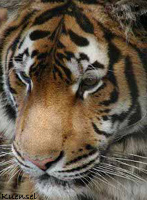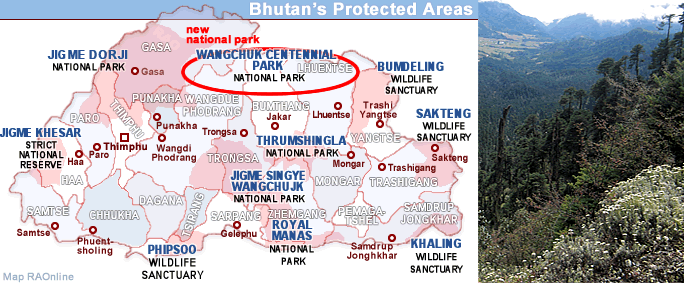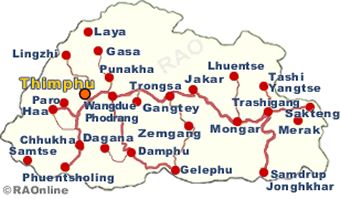 |
Bhutan's Nature National Parks |
|
 |
Bhutan Information |
|
|
 |
| Bhutan's
National Parks, Wildlife Sanctuaries and Nature Reserves |
 |
|
Bumdeling
Wildlife Sanctuary |
 |
Bumdeling
Wildlife Sanctuary (BWS) is located in the northeastern part of Bhutan and covers an area of 1538 sq. km encompassing parts of Trashi Yangtse,
Lhuentse, and Mongar Dzongkhags. The sanctuary was officially gazetted
in 1995 and operationalized in 1998 to protect large areas of virtually
untouched Eastern Himalayan ecosystems ranging from warm broadleaved
forests to alpine ecosystem.
| The
sanctuary is a show case for 293 species of birds, out of which 5 species
are included in the IUCN Red List of globally threatened and 4 species
globally near threatened, and another 6 recorded as restricted range species.
There are also 32 species of butterflies out of which some are identified
as rare. The park symbolizes the highest tiger habitat at 4000m,
which is quite rare in nature. Some of the important wildlife species include black
necked crane, red panda, Leopard, Himalayan black beer, tiger,
musk deer, Barking deer, wild boar, wild dog and fox. The park contains
one of the richest temperate forests in the eastern Himalayas with fir
forests as old as400
years old which form contiguous habitat for tiger distribution in Bhutan. |
|
 |
The
sanctuary is the habitat for big cats like Bengal tiger and common leopard. Bumdeling Wildlife Sanctuary is also one of the two winter habitats for
the black-necked cranes, which come down from the Tibetan plateau
to escape the extreme weather conditions. In addition the park also has
many sacred religious sites like Rigsum Gonpa, Dechhenphodrang monastery,, Singye Dzong, Pemaling and many sacred lakes, which are visited
by pilgrims from all parts of Bhutan making it special from cultural point
of view also.
top
|
Sakteng
Wildlife Sanctuary |
 |
Located
in the Eastern Part of Bhutan, Sakteng Wildlife Sanctuary with an
area of 650 Sq. Km is one of the new protected areas to be recently operationalised
in the year 2002. The two geogs of Merak and Sakteng under Trashigang
Dzongkhag falls under this Sanctuary. Sakteng Wildlife Sanctuary protects
the easternmost temperate forest ecosystems in the country with endemic
species like eastern blue pine, black-rumped magpie and many others
found only in the east. The Sanctuary is funded by Mac Author Foundation,
based in United States.
|
Phibsoo
Wildlife Sanctuary |
 |
Phibsoo
Wildlife Sanctuary located in the South-central Bhutan has been
operational since 2002 with the support of Bhutan Trust Fund and WWF Bhutan
Program. The Sanctuary has an area of 278 Sq. Km and falls under Sarpang
Dzongkhag. Phibsoo is unique for diverse flora and fauna such as elephant,
guar and golden langur. It is the only protected areas in the country
where natural Sal forest and chital deer are found.
|
Khaling
Wildlife Sanctuary |
 |
Khaling Wildife Sanctuary is located in the south-eastern part of Bhutan with an area of 273 Sq. Km. The Sanctuary covers only one Dzongkhag
of Sandrupjongkhar. It is yet to be operationalised. The Sanctuary
is important for elephant, guar and other tropical wildlife and
is the only habitat in Bhutan where pygmy hog and hispid hare occur.
|
Jigme Khesar Strict Nature Reserve (former Toorsa Strict Nature Reserve) |
 |
Jigme Khesar Strict Nature Reserve (former Toorsa Strict Nature Reserve) is located in the Western most part of Bhutan and covers two Dzongkhags of Haa and Samtse. It has an area of about
650 Sq. Km and is the only Reserve in Bhutan without human habitation.
The Reserve protects the westernmost temperate forest of the country from
broadleaf forests to alpine parks including the small lakes of Sinchulungpa.
The area is bordered by China in the West.
 |
| Courtesy Ministry
of Agriculture - DOF Nature Conservation Division |
top
top
| Wildlife and People in Bhutan |
 |
| Information on Bhutan |
 |
top
| Links |
 |
 |
 |
External
links |
|
|







